- Home
- Greg Keyes
The Charnel Prince
The Charnel Prince Read online
GREG KEYES
THE
CHARNEL
PRINCE
The Kingdoms of
Thorn and Bone
BALLANTINE BOOKS • NEW YORK
Table of Contents
Title Page
Dedication
Prologue
Part 1
Chapter 1
Chapter 2
Chapter 3
Chapter 4
Chapter 5
Chapter 6
Chapter 7
Chapter 8
Chapter 9
Chapter 10
Part 2
Chapter 1
Chapter 2
Chapter 3
Chapter 4
Chapter 5
Chapter 6
Chapter 7
Chapter 8
Chapter 9
Chapter 10
Part 3
Chapter 1
Chapter 2
Chapter 3
Chapter 4
Chapter 5
Chapter 6
Chapter 7
Chapter 8
Chapter 9
Chapter 10
Part 4
Chapter 1
Chapter 2
Chapter 3
Chapter 4
Chapter 5
Chapter 6
Chapter 7
Chapter 8
Chapter 9
Chapter 10
Part 5
Chapter 1
Chapter 2
Chapter 3
Chapter 4
Chapter 5
Chapter 6
Epilogue
Acknowledgments
About the Author
Other Books by Greg Keyes
Copyright Page
For Elizabeth Bee Vega
PROLOGUE
Had laybyd hw loygwn eyl
Nhag Heybeywr, ayg nhoygwr niwoyd.
The Forest speaks with many tongues
Listen well but never answer.
—Nhuwd nhy Whad proverb, given as a warning to young children
I HEAR A NOISE,” Martyn murmured, reining in his dappled gray stallion. “It is an unnatural sound.” The monk’s predatory blue eyes strained, as if trying to burn through the huge-girthed ironoaks and rocky slopes of the King’s Forest. Ehawk could see by the set of the man’s shoulders beneath his bloodred robe that every muscle in his body was tensed.
“No doubt,” Sir Oneu replied jovially. “This forest chatters like a woman who is half-mad with love.”
But despite his tone, Sir Oneu’s black eyes were serious when he turned to speak to Ehawk. As always, Ehawk was surprised by the older man’s face—soft and tapered it was, the corners of his eyes crinkled by fifty years of laughter. The knight hardly seemed to fit his reputation as a fierce warrior.
“What do you say, m’ lad?” Oneu asked.
“From what I’ve seen,” Ehawk began, “Brother Martyn can hear a snake breathe over the next hill. I haven’t such ears, and at this moment hear little. But sir, that’s strange of itself. There ought to be more birds singing.”
“Saint Rooster’s balls,” Oneu scoffed, “what do y’mean? There’s one warbling right now, so loud I can scarce hear myself.”
“Yes, sir,” Ehawk replied. “But that ’un is an etechakichuk, and they—”
“In the king’s tongue, boy, or in Almannish,” snapped a dour, sallow-faced man. He wore robes of the same color as Martyn’s. “Don’t gabble at us in your heathen language.”
That was Gavrel, another of the five monks traveling with the party. His face looked as if it had been cut into an apple and left to dry.
Ehawk didn’t like Gavrel much.
“Mind your own tongue, Brother Gavrel,” Sir Oneu said mildly. “I’m the one speaking to our young guide, not you.”
Gavrel glared at the reprimand, but he did not challenge the knight.
“You were saying, m’ lad Ehawk?”
“I believe you call ’em crow-woodpeckers,” Ehawk replied. “Nothing frightens them.”
“Ah.” Oneu frowned. “Than let’s have quiet, while Brother Martyn listens more closely.”
Ehawk did as he was told, straining his own ears to the limits, feeling an unaccustomed chill as the hush of the forest sank in. It was strange.
But these were strange days. Only a fortnight before, the crescent moon had risen purple, a dire portent indeed, and a weird horn had sounded on the wind, heard not just in Ehawk’s village but everywhere. The old oracle-women muttered prophecies of doom, and tales of awful beasts roaming and slaying in the King’s Forest grew more common each day.
And then these men had come from the west, a knight of the Church, resplendent in his lord’s plate, and five monks of the order of Saint Mamres—warriors all. They’d arrived in Ehawk’s village four days ago and bargained for a native guide. The elders had appointed him, for though Ehawk was scarcely beyond his seventeenth summer, there was no man more keenly gifted at hunting and tracking. He’d been excited to go, for strangers were uncommon here near the Mountains of the Hare, and he’d hoped to learn something of foreign lands.
He hadn’t been disappointed. Sir Oneu de Loingvele loved to talk of his adventures, and he seemed to have been everywhere. The monks were quieter and somewhat frightening—except Gavrel, who was outspoken and frightening—and Martyn, who was kind in his own brusque way. If he spoke laconically of his training and his life, what he did have to say was usually interesting.
But one thing Ehawk had not learned—what these men were searching for. Sometimes he thought they themselves did not know.
Sir Oneu doffed his conical helm and rested it under one arm. A stray beam of sunlight glinted from his steel breastplate as he patted the neck of his warhorse to calm it. He shifted his gaze back to Martyn.
“Well, Brother?” he asked. “What are the saints whispering to you?”
“No saints, I think,” Martyn said. “A rustling, many men moving over the leaves, but they pant like dogs. They make other strange sounds.” He turned to Ehawk. “What people live in these parts?”
Ehawk considered. “The villages of the Duth ag Paé are scattered through these hills. The nearest is Aghdon, just up the valley.”
“Are they warriors?” Martyn asked.
“Not usually. Farmers and hunters, same as my people.”
“Are these sounds drawing nearer?” Sir Oneu asked.
“No,” Martyn replied.
“Very well. Then we’ll go on to this village and see what the local people have to say.”
“Not much to look at,” Sir Oneu observed half a bell later, when they reached Aghdon.
To Ehawk’s eyes, Aghdon wasn’t that different from his own village—a collection of small wooden houses around a common square and a high-beamed longhouse where the chieftain lived.
The greatest difference was that his own village bustled with people, chickens, and pigs. Aghdon was empty as a Sefry’s promise.
“Where is everyone?” Sir Oneu asked. “Hallo? Anyone there?”
But there was no reply, and not a soul stirred.
“Look here,” Martyn said. “They were trying to build a stockade.”
Sure enough, Ehawk saw that a number of fresh-cut timbers had been erected. Others logs had been cut, but never set up.
“On your guard, fellows,” Sir Oneu said softly. “Let’s ride in there and see what happened to these folk.”
But there was nothing to be found. There were no bodies, no signs of violence. Ehawk found a copper kettle with its bottom scorched out. It had been left on the cookfire, untended, until its contents had boiled away.
“I think they all left suddenly,” he told Martyn.
�
�Yah,” the monk replied. “They were in a hurry for certain. They didn’t take anything.”
“But they were afraid of something,” Ehawk said. “Those wreaths of mistletoe above their doors—that’s to ward against evil.”
“Yes, and the stockade they began,” Sir Oneu said. “The praifec was right. Something is happening here. First the Sefry abandon the forest, now the tribesmen.” He shook his head. “Mount up. We’ll continue. I fear our mission is more urgent than ever.”
They left Aghdon and struck off across the uplands, leaving the largest of the ironoaks behind them and entering a forest of hickory, liquidambar, and witaec.
Still they rode in eerie silence, and the horses seemed nervous. Brother Martyn wore a slight but perpetual frown.
“Ride up with me, lad,” Sir Oneu called back. Obediently, Ehawk trotted his own dun mare until he was abreast of the knight.
“Sir Oneu?”
“Yes. Now would you like to hear the rest of that story?”
“Yes, sir. Indeed I would.”
“Well, you’ll recall that I was on a ship?”
“Yes, sir. On the Woebringer.”
“That’s right. We’d just broken the siege at Reysquele, and what was left of the Joquien pirates were scattering to the sea winds. The Woebringer was badly damaged, but so were a lot of ships, and no dearth of them ahead of us for repairs at Reysquele. The weather was calm, so we reckoned we could make Copenwis, where fewer ships go for dry-dock.” He shook his head. “We didn’t make it to Copenwis, though. A squall came up, and only the favor of Saint Lier brought us to a small island none of us knew, somewhere near the Sorrows. We made land in a longboat and gave offering to Saint Lier and Saint Vriente, then sent out parties to search for habitants.”
“Did you find any?”
“In a manner of speaking. Half the pirate fleet was camped on the leeward side of the island.”
“Oh. That must have been trouble.”
“Indeed. Our ship was too badly damaged for us to leave, and too big to hide. It was a matter of little time before we were discovered.”
“What did you do?”
“I marched over to the pirate camp and challenged their leader to a duel of honor.”
“He accepted?”
“He had to. Pirate chieftains must appear to be strong, or their men will not follow them. If he had refused me, the next day he would have had to fight ten of his own lieutenants. As it was, I relieved him of that worry by killing him.”
“And then what?”
“I challenged the second-in-command. And then the next, and so on.”
Ehawk grinned. “Did you kill them all?”
“No. While I fought, my men took possession of one of their ships and sailed away.”
“Without you?”
“Yes. I’d ordered them to.”
“And so what happened?”
“When the pirates discovered what had happened, they took me prisoner, of course, and the dueling stopped. But I convinced them the Church would pay my ransom, and so they treated me pretty well.”
“Did the Church pay?”
“They might have—I didn’t wait to see. I had a chance for escape, later, and took it.”
“Tell me about that,” Ehawk pleaded.
The knight nodded. “In time, lad. But you tell me now—you grew up in these parts. The elders at your village told many strange tales of greffyns, manticores—fabulous monsters, never seen for a thousand years, now suddenly everywhere. What do you make of that, Ehawk, m’ lad? Do you credit such talk?”
Ehawk considered his words carefully. “I’ve seen strange tracks and smelled weird spore. My cousin Owel says he saw a beast like a lion, but scaled, and with the head of an eagle. Owel don’t lie, and he’s not like to scare or see things wrong.”
“So you do believe these tales?”
“Yah.”
“Where do these monsters come from?”
“They’ve been t’sleep, they say—like how a bear sleeps the winter, or the cicada sleeps in the ground for seventeen year before comin’ out.”
“And why do you think they wake now?”
Ehawk hesitated again.
“Come, m’ lad,” the knight said softly. “Your elders were tight-lipped, I know, I suspect for fear of being labeled heretics. If that’s your fear, you’ve no worry about me. The mysteries of the saints are all around us, and without the Church to guide, folk think odd things. But you live here, lad—you know things I don’t. Stories. The ancient songs.”
“Yah,” Ehawk said unhappily. He glanced at Gavrel, wondering if he, too, had keener hearing than a normal man.
Sir Oneu caught the look. “This expedition is my charge,” he said, softly still. “I give you my word as a knight, no harm will come to you for what you tell. Now—what do the old women say? Why do unholy things stalk the weald, when never they did before?”
Ehawk bit his lip. “They say ’tis Etthoroam, the Mosslord. They say he woke when the moon was purple, as was foretold in ancient prophecy. The creatures are his servants.”
“Tell me about him, this Mosslord.”
“Ah . . . it’s only old stories, Sir Oneu.”
“Tell me nevertheless. Please.”
“In shape, they say he is a man, but made of the stuff of the forest. Antlers grow from his head, as on an elk.” Ehawk looked frankly at the knight. “They say he was here before the saints, before anything, when there was only the forest, and it covered all the world.”
Sir Oneu nodded as if he already knew that. “And why does he wake?” he asked. “What does prophecy say he will do?”
“It’s his forest,” Ehawk said. “He’ll do what he wants. But it’s said when he wakes, the forest will rise against those who have done it harm.” He cut his eyes away. “It’s why the Sefry left. They fear he will kill us all.”
“And do you fear that?”
“I don’t know. I only know . . .” He broke off, uncertain how to put it.
“Go on.”
“I had an uncle. A sickness came to him. There was little to see—no sores nor open wounds, no marks of fever—but he grew more tired as the months passed, and his eyes dulled. His skin paled. He died very slowly, and it was only near the end that we could smell the death in him.”
“I’m sorry to hear that.”
Ehawk shrugged. “The forest—I think it’s dying like that.”
“How do you know?”
“I can smell it.”
“Ah.” The knight seemed to mull that over for a few minutes, and so they rode in silence.
“This Mosslord,” Sir Oneu said at last. “Have you ever heard him called the Briar King?”
“That’s what the Oostish call him, Sir Oneu.”
Sir Oneu sighed, and looked older. “I thought as much.”
“Is that what you’re looking for in the forest, sir? The Briar King?”
“Yes.”
“Then—”
But Martyn cut him off suddenly. “Sir Oneu?” the monk’s face was set in hard lines.
“Yes, Brother?”
“I hear them again.”
“Where?”
“Everywhere. In all directions now. Coming closer.”
“What is it, Martyn? Can you tell me what we face? Minions of the Briar King?”
“I don’t know, Sir Oneu. I only know we are surrounded.”
“Ehawk? Is there aught you can tell us?”
“No, sir. I can’t hear anything yet.”
But soon enough he did. The wood stirred all around them, as if the trees themselves had come alive. Ehawk felt as if the forest was tightening, the trees standing ever closer together, a great trap closing on the company. The horses began to whicker nervously, even Airece, Sir Oneu’s warsteed.
“Ready yourselves, lads,” Sir Oneu muttered.
Ehawk caught glimpses of them now, the figures in the trees. They grunted and growled like beasts, they croaked and mewed, but they looked like
men and women, naked or wearing only the uncured skins of beasts.
Sir Oneu increased his pace to a trot, indicating that the others in the party should do the same. He lifted his heavy ashe spear. Ahead, on the trail, Ehawk saw that someone was awaiting them.
His heart was a cricket in his breast as they drew near. There were seven of them, some men, some women, cut and bruised and naked as the day they were born—all save one. He stood in front, a lion-skin thrown over one shoulder like a cloak. From his head grew spreading antlers.
“Etthoroam!” Ehawk gasped. He could no longer feel his knees clasping his horse.
“No,” Martyn said. “It is a man. The antlers are part of a headdress.”
Ehawk, trying to control his growing terror, saw that Martyn was right. But that didn’t mean anything. Etthoroam was a sorcerer. He could take any form.
“You’re certain?” Sir Oneu asked Martyn, perhaps sharing Ehawk’s doubts.
“He has the smell of a man,” Martyn said.
“They’re everywhere,” Gavrel muttered, jerking his head from side to side, peering at the forest. The other three monks, Ehawk noticed, had strung their bows and formed a loose perimeter around the group.
Martyn brought his mount alongside Ehawk’s. “Keep near me,” he said, voice very low.
“Ehawk, m’ lad,” Sir Oneu said. “Could those be the villagers?”
Ehawk studied the faces of those who stood with the antlered man. Their eyes were very strange, unfocused, as if they were drunk or entranced. Their hair was matted and tangled.
“I reckon they might be,” he answered. “It’s hard to say, them lookin’ like that.”
Sir Oneu nodded and drew to a halt ten yards from the strangers. It was suddenly so still, Ehawk could hear the breeze in the highest branches.
“I am Sir Oneu de Loingvele,” the knight called in a clear, carrying voice, “a peer of the church on a holy mission. Whom do I have the honor of addressing?”
The stag-horned figure grinned and raised his fists so they could see the snakes he held writhing in them.
“Look at their eyes,” Gavrel said, drawing his sword. He sounded grim. “They are mad.”
“Hold your hand,” Sir Oneu said. He rested his palm on his pommel and leaned forward. “That’s a clever reply,” the knight said loudly. “Most would give a name or speak some vapid greeting. You, with your deer-horn cap, you’re too clever for that. Instead, you shake snakes at me. Very cunning, I must say. A most excellent reply. I await your next witticism with utmost eagerness.”

 Godzilla
Godzilla Godzilla vs. Kong
Godzilla vs. Kong XCOM 2- Resurrection
XCOM 2- Resurrection Independence Day: Crucible (The Official Prequel)
Independence Day: Crucible (The Official Prequel)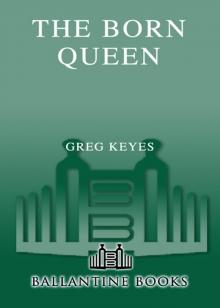 The Born Queen
The Born Queen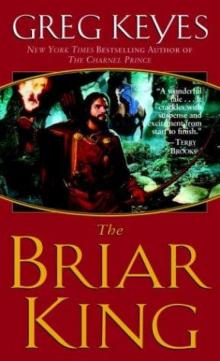 The Briar King
The Briar King Star Wars The New Jedi Order - Dark Journey - Book 10
Star Wars The New Jedi Order - Dark Journey - Book 10 Star Wars: New Jedi Order Book 8b: Emissary of the Void
Star Wars: New Jedi Order Book 8b: Emissary of the Void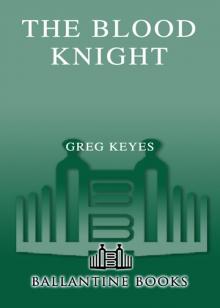 The Blood Knight
The Blood Knight Star Wars - Edge of Victory - Book 1: Conquest
Star Wars - Edge of Victory - Book 1: Conquest Edge of Victory 2 Rebirth
Edge of Victory 2 Rebirth Lord of Souls: An Elder Scrolls Novel
Lord of Souls: An Elder Scrolls Novel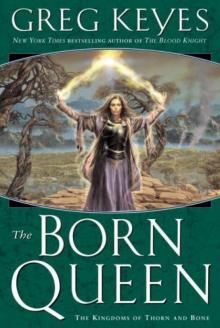 The Born Queen tkotab-4
The Born Queen tkotab-4 Rebirth: Edge of Victory II
Rebirth: Edge of Victory II Conquest: Edge of Victory I
Conquest: Edge of Victory I Emissary of the Void
Emissary of the Void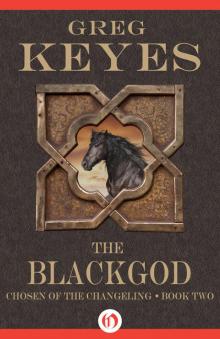 The Blackgod
The Blackgod Star Wars The New Jedi Order - The Final Prophecy - Book 19
Star Wars The New Jedi Order - The Final Prophecy - Book 19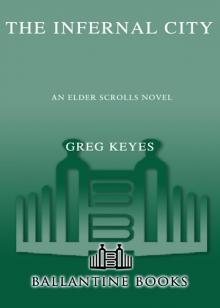 The Infernal City
The Infernal City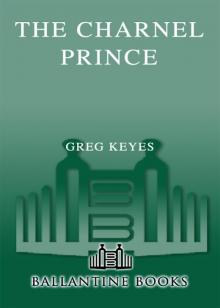 The Charnel Prince
The Charnel Prince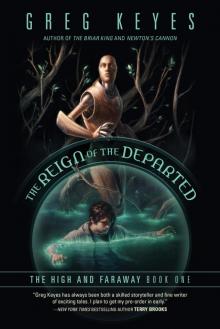 The Reign of the Departed
The Reign of the Departed Lord of Souls es-2
Lord of Souls es-2 Chosen of the Changeling
Chosen of the Changeling Dawn of the Planet of the Apes
Dawn of the Planet of the Apes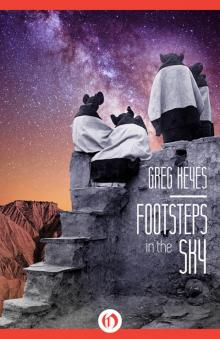 Footsteps in the Sky
Footsteps in the Sky PACIFIC RIM UPRISING ASCENSION
PACIFIC RIM UPRISING ASCENSION The Final Prophecy: Edge of Victory III
The Final Prophecy: Edge of Victory III